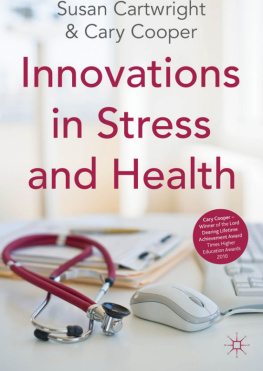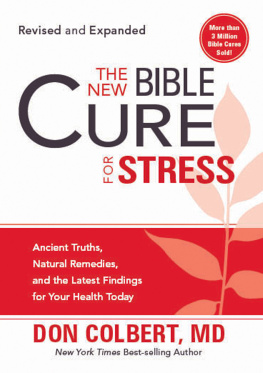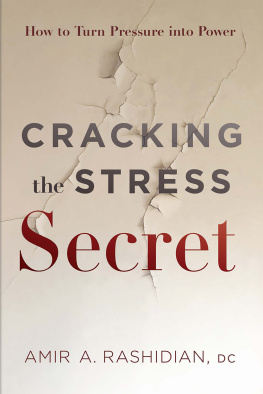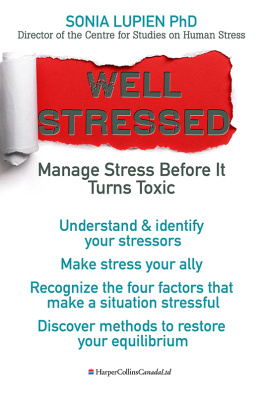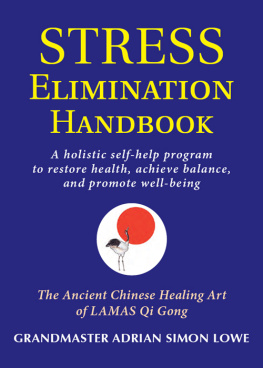INNOVATIONS IN STRESS
AND HEALTH
INNOVATIONS
IN STRESS AND
HEALTH
Edited by
Susan Cartwright
Professor of Organizational Psychology and Well Being and Director of the Centre for Organizational Health and Well Being, Lancaster University, UK
and
Cary Cooper
Distinguished Professor of Organizational Psychology and Health, Lancaster University


Susan Cartwright & Cary Cooper 2011
All rights reserved. No reproduction, copy or transmission of this publication may be made without written permission.
No portion of this publication may be reproduced, copied or transmitted save with written permission or in accordance with the provisions of the Copyright, Designs and Patents Act 1988, or under the terms of any licence permitting limited copying issued by the Copyright Licensing Agency, Saffron House, 6-10 Kirby Street, London EC1N 8TS.
Any person who does any unauthorized act in relation to this publication may be liable to criminal prosecution and civil claims for damages.
The authors have asserted their rights to be identified
as the authors of this work in accordance with the Copyright,
Designs and Patents Act 1988.
First published 2011 by
PALGRAVE MACMILLAN
Palgrave Macmillan in the UK is an imprint of Macmillan Publishers Limited, registered in England, company number 785998, of Houndmills, Basingstoke, Hampshire RG21 6XS.
Palgrave Macmillan in the US is a division of St Martins Press LLC, 175 Fifth Avenue, New York, NY 10010.
Palgrave Macmillan is the global academic imprint of the above companies and has companies and representatives throughout the world.
Palgrave and Macmillan are registered trademarks in the United States, the United Kingdom, Europe and other countries.
ISBN 9780230251915
This book is printed on paper suitable for recycling and made from fully managed and sustained forest sources. Logging, pulping and manufacturing processes are expected to conform to the environmental regulations of the country of origin.
A catalogue record for this book is available from the British Library.
A catalog record for this book is available from the Library of Congress.
Printed and bound in Great Britain by
MPG Group, Bodmin and Kings Lynn
CONTENTS
Susan Cartwright and Cary L. Cooper
Eric L. Teasdale and Sue C. Connelly
Susan Cartwright, John Cooper,
Dean Patterson and Philip Gibbs
Mark Blundell
Su Wang, Andrew Kinder and Richard Park
Hilary Abernethy
Susan Cartwright and Cary L. Cooper
LIST OF FIGURES
LIST OF CONTRIBUTORS
Hilary Abernethy, BSc (Hons), RGN, RMN, has worked in the field of mental health for over 25 years. She is currently Senior Public Health Improvement Specialist and Equality and Human Rights Lead Officer at North Lancashire Primary Care Trust.
Mark Blundell has worked for McDonalds for over 20 years and is Head of HR Operations, Talent and Resourcing.
Susan Cartwright, BA (Hons), MSc, PhD, is Professor of Organizational Psychology and Well Being and Director of the Centre for Organizational Health and Well Being at Lancaster University. She is a fellow of the British Psychological Society and a fellow of the British Academy of Management and has worked in the area of stress and health for over 20 years.
Cary L. Cooper, CBE, PhD, is Distinguished Professor of Organizational Psychology and Health at Lancaster University Management School, Chair of the Academy of Social Sciences, and President of the British Association of Counselling and Psychotherapy, and was lead scientist in the UK Government Office for Science Foresight project on Mental Capital and Wellbeing.
John Cooper has recently retired as Head of Corporate Occupational Health at Unilever Plc.
Sue C. Connelly MA, Dip Counseling, is Global Health and Wellbeing Director at AstraZeneca. She has worked for AstraZeneca for over 25 years, where she has developed a counseling and life management program to support mental wellbeing within the organization. She is currently responsible for developing and delivering their Global Health & Wellbeing strategy and vision, alongside Eric Teasdale.
Philip Gibbs recently completed his PhD at Lancaster University and is currently Head of Wellbeing at Roodlane Medical.
Andrew Kinder, MSc, AFBPsS, MAC, MBACP, FBACP Registered Practitioner Psychologist, is a chartered Counseling and Occupational Psychologist. Andrew joined the Post Office in 1995 and was transferred to Royal Mail Groups outsourced OH Provider, Atos Healthcare, in 2002. He is Chief Psychologist.
Richard Park MBACP, CQSW, MA, Diploma in Organizational Counselling is a BACP accredited counselor. He joined the Post Office Welfare department in 1992 and was transferred to Royal Mail Groups outsourced OH provider, Atos Healthcare, in 2002.
Dean Patterson is Global Health and Productivity manager at Unilever Plc.
Eric L. Teasdale MB.ChB, FRCP, FFOM, FRCGP is the Chief Medical Officer Global Health and Wellbeing for AstraZeneca. Eric is also an Honorary Professor at the School of Health and Medicine, Lancaster University.
Su Wang, MBBS, FFOM, MScom, DIH, DPH, DMS, CAM, SFIIRSM, MIEHF, is an accredited Specialist Occupational Physician and was Group Head of Health in Royal Mail from 2002 to 2009. She is a fellow of the Faculty of Occupational Medicine and a qualified coach. Her work at Royal Mail won several prestigious awards and showed a contribution of 227 million to Royal Mail.
CHAPTER 1
INTRODUCTION
Susan Cartwright and Cary L. Cooper
The costs of stress and ill health to society are enormous. The recent report by Black (2008) commissioned by the UK government on the health of the working age population estimated the annual cost of sickness absence and worklessness associated with working-age ill health to be in excess of 100 billion. Stress-related conditions, such as anxiety and depression, are the second most common reason for absence from work in the UK (HSE 2006) and Europe, and the World Health Organization (WHO) predicts that by 2020 five of the top ten medical problems worldwide will be stress-related. In addition, stress has been shown to be a predictor of work-related accidents and safety errors (Clarke 2008). In the wider population, one in four people experiences mental ill health problems each year and nearly a third of all diseases and disabilities are linked to peoples lifestyle behaviors.
Recent estimates in the UK (Sainsbury Centre for Mental Health 2007) suggest that lost days due to mental ill health problems cost employers 8.4 billion per year. However, it is also estimated that the costs of presenteeism, that is employees attending work when they are not fit to do so, are even higher and amount to a staggering 15.1 billion in terms of reduced productivity.
The Health and Safety Executive (2006) defines stress as the adverse reaction people have to excessive pressure or other demands placed on them. In the work environment, stress arises when the demands of work exceed the employees ability to cope with or control them. An important distinction is made between pressure, which can be positive if managed correctly, and stress, which can be detrimental to health. The potential sources of stress at work are many and various and include excessive workload, unclear roles, lack of adequate support and supervision, poor or abusive relationships, organizational change and poor worklife balance.
Next page
